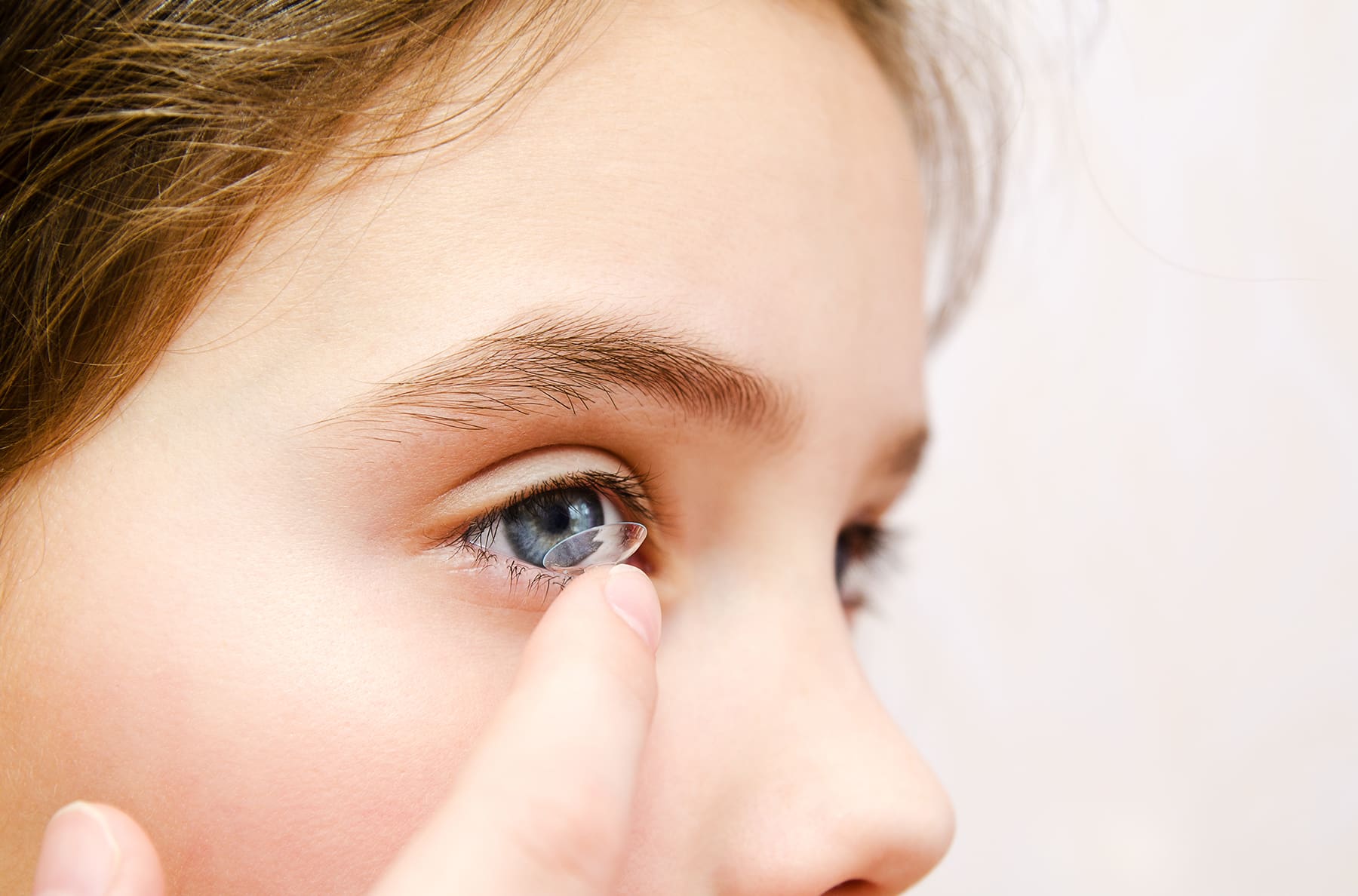Reviewed By Dr. Jodi Kuhn
Reading time: 4 minutes
Contact lenses can give children clearer vision, more freedom in sports, and a boost in confidence. But before making the switch from glasses, parents need to know how to balance the benefits with the responsibility. Success with contacts depends less on age and more on a child’s maturity and ability to follow hygiene rules every day.
Table of Contents
Key Takeaway
If your child has good general hygiene, follows directions carefully, takes responsibility for their belongings and can manage simple routines on their own, they may be ready for contact lenses.
How to Tell if Your Child is Ready
The best way to decide if your child is ready for contact lenses is to look at their daily habits. Kids who succeed with contacts usually show they can:
- Keep their hands clean without constant reminders
- Follow directions carefully and consistently
- Take responsibility for their belongings
- Manage simple routines on their own
If these habits are not second nature yet, glasses remain the healthier choice until your child grows into the responsibility.
Best Contact Lenses for Kids
Daily disposable soft contact lenses are the safest starting point for children. Each pair is used once and then discarded, which removes the need for lens care products or storage cases. This reduces the risk of infection and keeps the routine simple for both parents and kids.
Reusable contact lenses, such as two-week or monthly disposable lenses, are another option. They cost less per pair, but they require strict cleaning with lens solution and careful storage. If your child is not consistent with hygiene, these lenses may cause more problems than they solve.
Specialty Options
In addition to standard lenses, some children may benefit from specialized designs. Orthokeratology (ortho-k) lenses, worn overnight, reshape the cornea to allow clear vision during the day without glasses or contacts. They are used to help slow or halt the progression of nearsightedness, but they require very careful hygiene, frequent follow-up visits, and strong cooperation between the child, parents, and eye doctor.
Benefits of Contact Lenses for Kids
Contacts offer several advantages beyond clear vision correction.
- Contact lenses give a wider field of view than glasses, which helps with learning, sports, and peripheral vision.
- They do not fog, slip, or break during active play.
- Wearing contacts can improve self-confidence in social situations.
- Certain lenses, including ortho-k lenses and specialty soft designs, may help with myopia control and slow myopia progression.
Risks to Consider
The safety of contact lenses depends on how carefully they are worn and cared for.
- Eye infections can develop from sleeping in contacts, rinsing them with water, or touching them with dirty hands.
- Scratches may occur if a lens is dirty, worn too long, or if the wear schedule is ignored.
- Sensitivity to lens solution may cause irritation or discomfort.
- Overuse reduces oxygen to the eyes, affecting overall eye health and leading to redness or pain.
With proper habits, most children avoid these issues. The key is consistency. When kids stick to healthy routines every day, contacts can be a safe and comfortable choice.
Hygiene Habits That Protect Eye Health
Good hygiene is the foundation of safe and comfortable contact lens wear. These simple habits help reduce the risk of irritation and infection:
- Always wash and dry hands before handling lenses.
- Always remove lenses before going to bed.
- Use only fresh lens solution—never water or saliva—for cleaning and storing lenses.
- Replace contact lenses and storage cases on the schedule recommended by your eye doctor.
- Take lenses out right away if there is any redness, pain, or unusual discharge.
What to Expect at Youth Vision
At Youth Vision, our eye doctors guide families through the process step by step:
- Review your child’s history, sports, and daily routines
- Perform comprehensive eye exams and measure for proper fit
- Teach your child how to insert and remove lenses safely
- Provide a trial period with a clear wear schedule
- Schedule follow-up visits to confirm safe, comfortable contact lens wear
Schedule an Eye Exam at Youth Vision
At Youth Vision, we help parents decide if their child is ready, fit them with the safest lens type, and teach them how to protect their eye health. We accept Medicaid and welcome children and adults at all of our locations.
Schedule an exam today at the location most convenient for you:
- Denver Youth Vision, located at 1400 Grove Street, Denver, CO 80204, 303-825-2295
- Aurora Youth Vision, located at 14251 E. 6th Avenue, Aurora, CO 80011, 303-343-3133
- Thornton Youth Vision, located at 9674 Washington Street, Thornton, CO 80229, 303-953-880
- Hampden Youth Vision, located at 7400 East Hampden Ave. Unit C1, Denver, CO 80231, 720-866-9906
FAQs
Can a 9-year-old have contact lenses?
Yes, if they are responsible enough to care for them. Readiness depends more on habits than age. If a child washes their hands well, follows directions, and can manage small daily routines with a parent’s support, contact lenses may be a safe option. Daily disposables are often the best first choice.
Who should avoid contact lenses?
Children who struggle with hygiene or need frequent reminders for simple tasks may not be ready yet. Kids with ongoing eye infections or significant allergies may also do better with glasses until their eyes are healthier and their routines more consistent.
Where can I get contact lenses near me?
Youth Vision offers exams and contact lens fittings for children and adults. Our doctors will check readiness, recommend the safest type of lens, and provide hands-on training for both kids and parents. Medicaid is accepted at all locations.


